#mobility aids mean freedom
Text
This is a reminder that you can still serve cunt while using a mobility aid, hope that helps
#shit post#chronic pain#disabled#mobility aid#mobility aids mean freedom#ambulatory wheelchair user#chronic illness#cripple punk#arthritis#ehlers danlos syndrome#chronically ill
12K notes
·
View notes
Text
Finally had a chance to post my customized mobility aids. First up, my cane!
Pictured: a foldable purple cane covered with stickers of cartoon ghosts, cats, spiders, and candy. End picture ID.

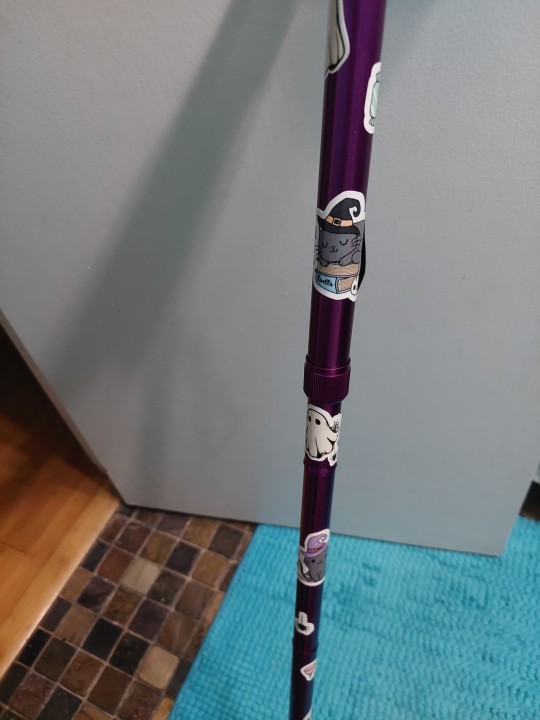



Next up, my found-for-free-on-social-media-that-I-painted-and-fixed-up walker! It includes my handmade glow in the dark dinosaur basket, custom made grippers, and a custom paint job. It is an electric blue base, accented with sky blue for the wheels and bottoms, with lime green accents around the rings in the middle. The basket and hand grippers are made from a Dollar Tree blanket with various dinosaurs that if left in the sun long enough DO glow in the dark. It is all made by me.
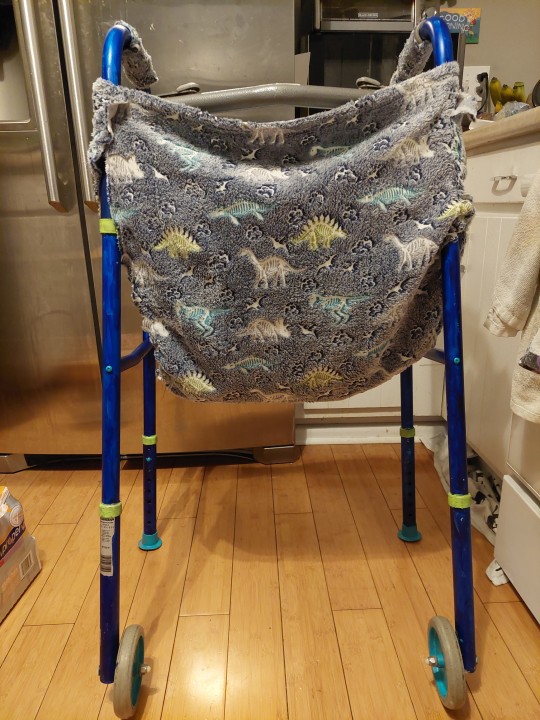
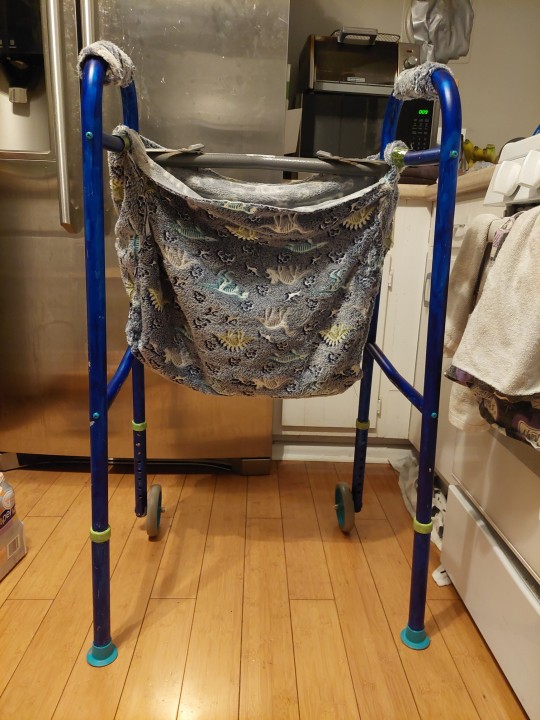

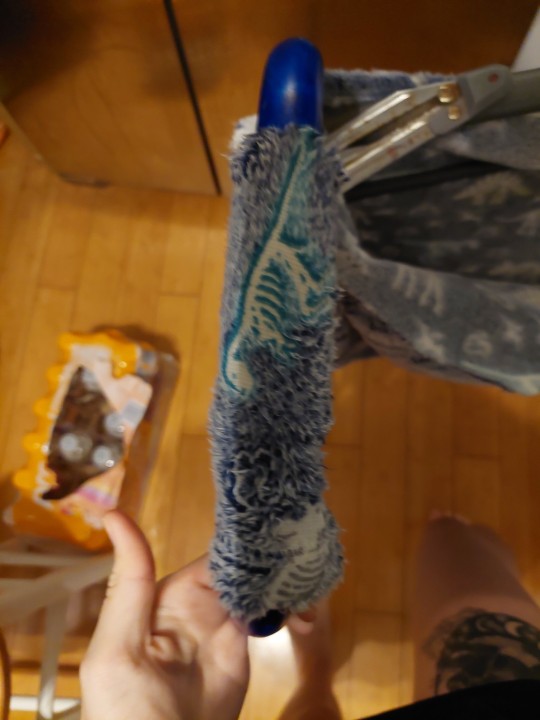
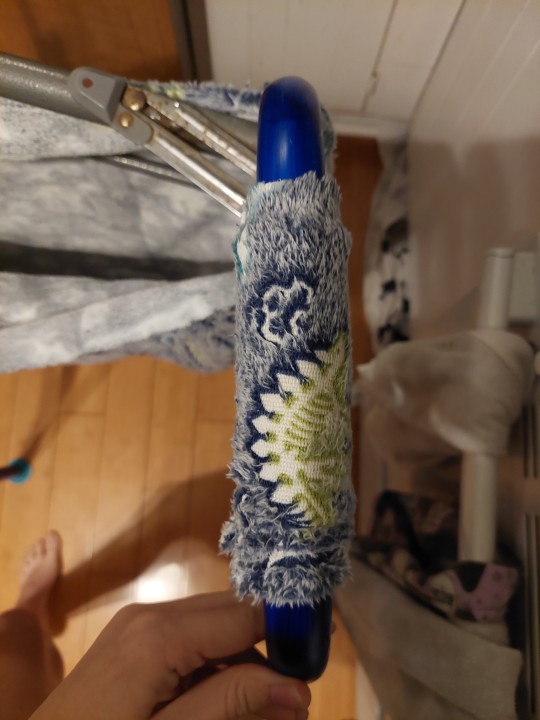
#disabled and proud#disabilities#disabled artist#disabled#physical disability#physically disabled#invisible disability#disability#my art shit#handmade#i made this#i made dis#my mobility aid#mobility aids mean freedom#mobility aid#customization#cane user#cane#walker#ambulatory wheelchair user#ambulatory cane user#ambulatory mobility aid user#dinosaur#glow in the dark#disability advocacy#disabilties#heds#hypermobile eds#fibromyalgia#ehlers danlos zebra
28 notes
·
View notes
Text
Disabled representation I personally would like to see:
-Ambulatory mobility aid users.
-Characters who’s disability DOES stop them. Characters who struggle with things because they’re disabled. Characters who learn to overcome those obstacles with accessibility, not with magically fixing their disability.
-Sporty disabled characters.
-Outgoing wheelchair users.
-Really cool looking mobility aids.
-Disabled characters who don’t get ‘fixed.’
-Young disabled characters.
-Disabled characters who are just…disabled. Like it’s not a huge plot point, it’s just kind of a side thing. She has to stop the sun from crashing into the earth! (Also she uses forearm crutches)
-Disabled characters who have negative traits. We need more disabled mean girls. I want to see a queen bee who uses a cane.
-Disabled characters who’s stories do have disability as a big plot point. Disability is important to disabled peoples’ lives and there’s nothing wrong with it being an important plot point in stories about us, if it’s written well and accurately!
-Disabled characters having unsupportive parents. I don’t mean evil parents who hate them, I mean flawed parents who push their kid too hard because they think that’s what they should do and they don’t realize that it’s hurting them. Flawed parents who continue to tell their kid that they “can do anything” when there are very real obstacles in their kid’s way due to disability.
-Disabled characters who see their mobility aids as freedom and love their mobility aids!
I just want complex disabled stories about complex disabled characters!
#disabled#disability#mobility aid#wheelchair user#wheelchair#chronic pain#cripple punk#physically disabled#cripplepunk#cane user#my ramblings
10K notes
·
View notes
Text
Do not tell someone their mobility aid isn’t cute.
Please, for the love of any god that exists and the ones that don’t too, don’t tell someone their mobility aid isn’t cute. Don’t tell them it ruins their outfit. Don’t tell them they’d look better without it. Don’t.
Why? Because chances are, they were very insecure about it before. Maybe they still are. And also because it’s fucking ableist. You’re telling them that using a mobility aid looks bad. I don’t care if you think the outfit would look ten times better without it, keep that shit to yourself. You’re not the one wearing it and if the person has decided that their functionality is more important than their appearance, then that’s their choice to make, not yours.
Mobility aids are there to help the person using them, not to appease your idea of beauty.
And, not to mention, mobility aids are fucking cute.
The braces worn on the outside of pants because that’s more comfortable or they don’t fit underneath or it’s uncomfortable otherwise? Rock on. Canes that are decorated or otherwise but let someone get around easier? Fantastic. Crutches that let someone participate in society? Amazing. Wheelchairs that mean someone doesn’t have to be in unnecessary pain? 10/10. Walkers that give someone the freedom to do things they want to? Spectacular. Freaking prosthetic limbs?? Iconic. Insulin or blood monitoring patches that means someone doesn’t have to be thinking about yet another thing while they go about their day? Beautiful. Feeding tubes that mean someone can fucking get nutrients? Cute as hell.
If you have something that makes your life easier and you use it, that automatically makes you smart and hot. You have my permission to hit anyone who says otherwise (with your mobility aid if applicable).
TL;DR: Mobility aids are cute and anyone who says otherwise is stupid.
#disabled#actually disabled#mobility aids#ableism#mobility aids are cool#disability#disabled things#use mobility aids
1K notes
·
View notes
Text

Liberation is a Daily Practice also during Christmas
This year, the holiday season arrives with the hardships of displacement, homelessness, starvation, and lack of shelter from the cold. Churches across Palestine have cancelled their historic Christmas festivities in protest of Israel’s settler-colonial genocidal campaign against the people of Gaza to pave the way for grief and political action.
While succumbing to the sedative of consumerism is commonplace during the holiday season, this year, such distractions will not halt our commitment to our values of freedom and justice. We pledge to counter the colonizer’s Christmas capitalism with our mobilized solidarity with the Palestinian people.
The Israeli regime and its imperial abettor, the United States, rely on the general public to remain distracted by consumerism so that they can continue to profit off of the genocide of the people of Gaza.
We, Queers in Palestine are steadfast in our presence in the streets and on our land, strategic in how we consume, and focused on the road to liberation. We are calling on everyone to join us in action:
Keep Palestine central during the holiday.
Keep countering the hegemonic colonial narrative: talk about Palestine in the family, friends and community gatherings.
Resume the disruption of the flow of commerce: commit to a sustained boycott of Israeli products, institutions, and corporations complicit in genocide. Where we spend our money shapes our reality.
Attend actions, keep taking to the streets and bring your loved ones with you.
Raise the flag of Palestine wherever you are.
Remember all those whom we have lost, support and aid the injured survivors and the grieving, and stand behind the ones who are steadfast in their resistance by all means possible.
Empires and colonial entities spend billions in the hopes that we may reach a moment of frustration and to convince us that we have no agency over our fate and political future. Capitalism sells us instant gratification, and we reject that notion which aims to pacify and debilitate those who are committed to the struggle.
The Palestinian liberation struggle is cumulative of the past 75+ years, and this past month we have witnessed massive ideological shifts in the global narrative, as well as heightened political mobilization around the world, as a result of the dedication of those who have remained steadfast and committed to fighting for justice.
Yet, it is imperative that we keep going, and to remember that no normal life and “business as usual” can go on while an entire population is being wiped out of the face of the earth. So we urge those standing in solidarity with us to commit to the daily practice of organizing which doesn’t take a break even during the holiday season.
-- Queers in Palestine
A Liberatory Demand from Queers in Palestine | No Pride with Genocide
231 notes
·
View notes
Text
The fuck is up with abled people and thinking that using or having a mobility aid makes us weak? Or that our goal should be to not use them? Why can’t they just accept that using mobility aids is not a bad thing and that we use them because they help and give us more freedom? My mobility aids enable me to do so much more than I can without them and my goal is not to get rid of them or not use them or whatever my goal is to have the ability to do what I want and be independent and not be in excruciating pain. Maybe at some point I wont need my mobility aids but right now I do so idk about other disabled people but stop telling me to try to not use something that makes my quality of life so much better and stop telling me to get better soon I’m just trying my best and the fact people don’t see that is really disheartening just because I don’t fit what someone thinks i should look like or be doing to “get better” doesn’t mean they should feel free to tell me their opinions on my body and what I do to accommodate myself
Honestly this started out as a rant about ableist bullshit regarding mobility aids but it definitely applies to so much else like neurotypicals complaining about how I accommodate my autism and telling me to “just be normal” and other shit like that.
It definitely applies to more than what I’ve said here but goddamn it abled people stop policing disabled bodies and minds, stop trying to control us, stop thinking you know our bodies better than we do
Tl;dr: abled people need to stop with their bullshit and leave disabled people and their tools and accommodations and self accommodations alone. Abled people believe they know our bodies better than we do and that’s simply not true.
#disabled#chronic pain#disability#actually disabled#chronic illness#physical disability#hypermobility#pots#pots syndrome#autistic#autism#autistic problems#actually autistic#autistic adult#disabled adult#physically disabled#ableism#ableist#ableist people#anti ableist#ableist parents#ableist society#mobility aids#mobility aid#babe with a mobility aid#accommodations
289 notes
·
View notes
Text
Hi friends,
it's absolutely okay to use disability aids if they help you, and you are allowed to be the one who decides if they will help you.
I spent Christmas in a non-weight-bearing cast, and a friend of mine suggested I use her backup wheelchair so that I didn't have to use crutches for the whole time. I was initially resistant, but I'm glad I got over it.
It made a huge difference. It allowed me to work my job with minimal accommodation, and allowed me to be independent outside of work. I was able to go out and shop for holiday presents. I could leave my house and not worry about if I was going to get too tired to move. It was better for my body, because I wasn't putting my entire body weight on one hip or leg. It helped me be treatment compliant, because I didn't have the constant temptation to put my foot down and put a bit of weight on it. It allowed me to carry things and shop on my own. I was able to work at my job, make sales, and earn commission. The only work-related things I needed help with was to have us move our office plant (whose name is Randal) and to get help carrying large or heavy boxes. My doctor had approved return-to-work paperwork that said I had to sit down for 75% of my shift, and with a wheelchair, I was easily able to do this without going on disability or medical leave.
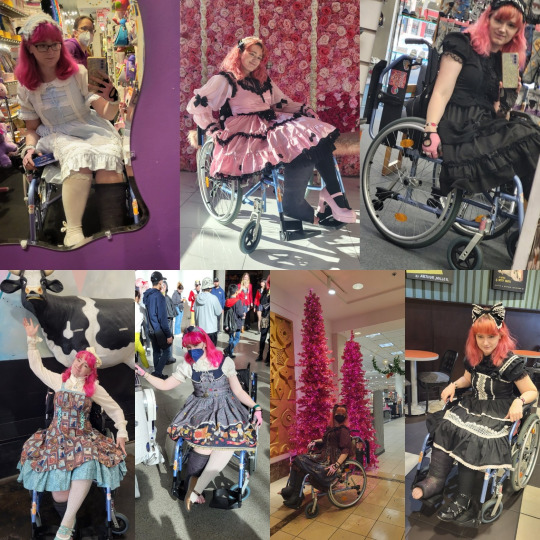
Here's a collection of pictures of me, not being stuck on the couch in my house.
And people, both friends and customers, were so very weird about all of this.
A lot of people questioned if it was some kind of overkill, because many people who can't bear weight on one leg will use crutches or a kneeling scooter. Other people commented on how inconvenient is had to be, and how difficult things had to be when I was using a wheelchair.
And I realized that other people saw me, compared their level of ability to what they thought mine was, and decided that using a wheelchair was difficult and inconvenient. What I saw was what my level of ability would be without the wheelchair, and what it was with it. Carrying a drink wasn't doable via wheelchair, crutches, or kneeling scooter, but I'd be unable to carry a drink in the wheelchair and people would see it as a huge inconvenience. (BTW the answer is just to get boba at a place that seals the lids on, carry it in your lap, and punch the straw through once you're at a place where you can set it down. Boba lids are wheelchair-friendly).
I think people see "wheelchair" as the ultimate in disability, but for me it was freedom to take care of myself. People want to save using a wheelchair for when you absolutely cannot function without it, but you deserve to be happy and not just to function.
And the fact is, if people are unable to judge my disability aids by understanding the options to them, and if they're only able to judge my mobility aids by comparing their personal ability to how they'd feel using my mobility aid, then there's no way whatsoever that someone else can judge if I actually need it, or not. But I deserved to be using the thing that gave me the most freedom, impacted my life the least, and was the least damaging on my body.
Anyway, I've spent the morning trying to convince someone I know who broke their leg that using a wheelchair is better than staying at home on the couch. I'm not making a lot of progress with that, so hopefully I can make some progress with my friends on the internet who might be going through something. You deserve to be comfortable and happy, and not just to exist. If you do things that take care of your body, instead of hurting it by refusing to take the help that you need, you'll be able to function better. Wheelchair isn't a bad or dirty thing, and it doesn't have to be a means of last resort. You can use it if it helps you.
#fun fact i went through all of this with hearing aids back when i started that#but still had to go through it again when i broke my foot#i guess i don't learn#also technically i didn't break my foot i just has swollen bone marrow#didn't know bones can swell and want to go back to not knowing that
280 notes
·
View notes
Text
I need people to stop acting like me getting a wheelchair would be a bad thing.
I have chronic fatigue syndrome, fibromyalgia, suspected hypermobile Ehlers-Danlos, and a smattering of other illnesses which combine to leave me constantly exhausted and in pain. I'm often housebound, and on my worst days I'm bed-bound.
I've had some adaptations to my house to help me with standing up for more than a couple of minutes, and I'm being assessed to get a carer. People have fully understood without me explaining how these things would really help me and improve my life.
I've also been pushing to be seen by the NHS wheelchair team. Standing and walking is just exhausting, and it's often the reason I can't go to different places. Getting around the supermarket would be so much less of an energy drain if I didn't have to walk. I'd be able to do more than one or two things in a day without risking an energy crash, or making my pain worse, or my joints collapsing and me falling over.
A wheelchair means freedom. I love my house and my cat, but being able to go out more often would be incredible. I'm sure it would do wonders for my mental health.
But so many people react with sadness when I say I'm waiting for assessment to get one. I hired one from the red cross once, and when I returned it the staff said getting "trapped" in one would be "sad", especially given how young I am. People have said things like, "oh I'm so sorry you have to do that", or "that must be so hard."
Part of the reason I struggled to get referred to the wheelchair team in the first place was because doctors would say, "oh you're so young", or "let's only look at that as a last resort."
Mobility aids do not represent giving up. Quite the opposite. As things stand right now, I can only do shorter trips and I can't walk far. Can't stand in queues or to look at things. I love museums and stately homes and aquariums and zoos and parks and gardens and shopping and concerts, but I can't get round them to see them.
A wheelchair isn't a trap. Ableism is a trap. A wheelchair could let me fly.
42 notes
·
View notes
Note
In your latest post (the one above height and combat just in case you are only now seeing this), you talked mainly about hand-to-hand combat. Would the rules about your center of gravity also apply in things like swordfighting? I have a super short swordswoman who I'd like to have take advantage of this, but I'm not sure if and how the rules on that front would change when you added weapons into the mix, so I thought I'd ask.
Legitimately, not much.
Most of what I described still holds true. Reach is based on your limb length plus the length of your blade. Now, obviously, if you have a long knife and your foe has a zweihander, that will really matter, but with nominally similar weapons, the difference in reach is going to be marginal at best.
Knocking someone off their feet is still easier if they have a higher center of gravity. Interestingly, you can parlay some stability into mobility. When it's broken down like this it does sound a bit artificial, but all it means is that lunging or dodging without losing your footing is easier if you have a lower center of gravity. For most martial artists (including with armed martial arts) a lower stance will give you a bit more freedom of movement. With swords this is both a benefit and liability, as it means you can lunge a bit more easily, but you can also lunge onto your opponent's blade a little more easily.
Interestingly, swords (and, really, most weapons) have both a maximum and minimum effective range. If you can get in close enough, you can prevent your opponent from effectively using their sword. This means that, while it's a little unusual, the description of throwing someone, can occur in a sword fight, though, it is extremely unlikely.
Following on that, it's basically impossible to get inside a sword's threat range if your opponent is prone, and you are standing. Though, the trade off is that they lose a lot of mobility, and probably can't effectively protect their legs. On the ground against an armed foe is not a situation you want to be in, but at least your foe can't bypass your sword.
Depending on the swords in question, this is a case where center of balance is a little less important. Yes, a strong stance, and a low center of gravity will always aid you in a fight. The issue is that, in the hands of a skilled user, the sword itself is an incredibly lethal weapon.
The second thing, and this applies to all combat, is that there's the underlying theory, but when you look at live combat, all you're actually graded on is your ability to survive. That, innately, lower center of gravity is extremely useful in a live situation, because it gives a woman a much lower stance than she's intentionally adopting. That works with unarmed combat, and it works with armed combat. The reason we focus on the theory is, a better intuitive grasp of that technique will benefit you in a live situation. It's the same reason that you drill in the same motions over, and over, until it is second nature. It's not because you need to do it perfectly, you need to be able to do it reasonably well while managing a lot of other critical information. And, while this is rapidly turning into a random tangent, live combat is about information management. Effectively processing what's going on around you, without having to think about what you're doing, is the key to survival. The less you have to think about how you should be standing, the more mental bandwidth you'll have to deal with the screaming sack of meat that is trying to run thirty-six inches of steel through your internal organs.
Most of what I said in the previous post is agnostic of armed versus unarmed combat. The major exception was the examples of Judo, because, as far as I can remember, Judo doesn't really do much with armed combat, and the only armed martial arts that put any significant thought into groundfighting, are some schools of knifefighting. There are ground fighting techniques for various knives, and some martial arts (such as MCMAP) do think it's important to ensure their practitioners can survive getting dragged into the mud. (I've also seen some karambit groundfighting choreography, but I have no idea if that's based on an actual martial art. It would not surprise me if there is armed groundfighting in Silat.)
-Starke
This blog is supported through Patreon. Patrons get access to new posts three days early, and direct access to us through Discord. If you’re already a Patron, thank you. If you’d like to support us, please consider becoming a Patron.
114 notes
·
View notes
Text
Things disabled people wish you knew about mobility aids!
I am more mobile with my mobility aid than without.
Stop asking me when I'll get better.
When I don't have a mobility aid and am using a shopping cart, do not take it, I am leaning on it so I can be on my feet longer.
Stop asking me why I need a mobility aid when we're strangers.
I decorate my cane, it feels like a part of me, please give me space to feel sad when I have to replace it.
People will walk into me or gotten very close, please don't stare at your phone while you walk.
Mobility aids are not depressing.
Mobility aids help us to live fuller and more independent lives with less symptoms.
I love my mobility aids! I don't want the focus of my treatment to be getting rid of them, I want it to be improving my symptoms.
Mobility aids don't have to be boring and plain. A mobility aid being decorated doesn't mean I don't need it!
I don't need help unless I ask for it.
Disability isn't taboo, let your kids be curious and ask questions.
Stop moving my mobility aid(s) without asking me. My mobility aid(s) are an extension of my body.
I don't just use my mobility aid for shits and giggles, I need it. It is not for show it is not for attention and implying it is is incredibly ableist.
People use mobility aids differently, some people use their mobility aids all the time and some people don't. I don't need my mobility aid 24/7.
I switch sides with my cane and constantly have to worry about being fake claimed when in reality I just need it for both of my legs.
I'm still disabled even though I'm fat and have invisible disabilities.
I'm still disabled and in pain even when I'm not using any mobility aids.
I'm not a baby, I'm not just fat, I'm not just weak. I am disabled and I like to think I'm stronger than most non-disabled people.
It's really weird to make comments or gestures when I'm in my wheelchair. If you wouldn't say it to someone who doesn't have a wheelchair don't say it to me.
Don't bend down to talk to me it's hella weird. Just talk to me like you would talk to anybody shorter than you.
Just because I'm not using my mobility aid doesn't mean I'm suddenly better!
I'm just as disabled when I'm not using my mobility aid.
Going a few days without my mobility aid doesn't mean I'm no longer disabled.
Just because I don't always need my mobility aid does not make it a toy.
Mobility aids can be incredibly helpful and we shouldn't have to be embarrassed to use them.
If I'm in my electric wheelchair and I'm in front of an aisle you need to get to just let me know, don't reach over my lap like I'm not a person.
If you don't step out of my way as a wheelchair user I am going to hit you, that's not a threat, it just will happen. You have a lot more maneuverability than I do.
If I'm using my mobility aid, you can be respectful and accomodate me without making it a thing. I know my limits and capabilities. Using a cane does not make me weak or helpless.
It's really funny seeing you guys jump to get out of the way when I use my cane, the space is appreciated, but it's still really funny to see the look on your face.
Please stop praying for my "recovery" there is none!
My rollator gives me freedom! I can go more places without having to worry about a lack of seating. I can actually walk faster with it than without it.
My mobility aid shouldn't be a horrifying last resort, it helps me so much, even when I'm not at my absolute worst!
------------------------------------------------------------------------------
Thank you so much to everybody who participated! Happy disability pride month everyone!
#mobility aids#cane user#rollators#wheelchair#disability#chronic illness#spoonie#chronic pain#chronic fatigue#crutches#psychical disablity#disability pride#disability awareness#actually disabled#mobility assistance#physically disabled#anti ableism
111 notes
·
View notes
Text
walkable cities is the colloquial term for what we in landscape architecture and civil engineering call "accessible infrastructure" which sort of has the inverse effect of making it seem exclusively focused on accessibility for the disabled. the goal for (respectable) professionals is to create a seamless city with as few catching points as possible for as few people as possible. This means it will be a "walkable" city (read: gives the most individuals the greatest degree of freedom to move between the most points). This Obviously includes people with mobility aids, it also includes parents with small children in strollers, and blind people, and those with cognitive disorders, and the elderly, and young children who should, in a functioning urban area, be able to take themselves to school, or a friend's house, or after school activities. there will never be only one solution to creating accessible infrastructure, which is why you should never trust someone claiming a single approach will solve everything. There will always be someone who needs a car, but if we create spaces which are less violently inhospitable to anyone outside a car, it opens up a lot of new interesting solutions to sustainable transportation.
anyways this has been my rant in response to someone else's very incorrect rant about how "walkable cities is an ableist framework and if you claim that people saying this is a psyop you're evil and cruel". I understand the person who made the post probably just doesn't understand the term or how it is used among the people actually designing things so I didn't want to dump this on their post. I also think the original post calling this (incorrect) position a psyop probably is just one misguided person reacting to other misguided people so like. not really on anyone's side here just trying to explain the actual intent behind the terms so maybe everyone can just calm down a little
#sorry for this lol#i just needed to get it out#it was making me mad that people think the ACTUAL ethos is just to Make everyone walk and bike everywhere#its just not trueeeee#long post#sustainable design#accessible design#accesible infrastructure#walkable cities#walkable infrastructure#walkable design#civil engineering#landscape architecture
360 notes
·
View notes
Text
The 10th Day of G-Witch: If I Could Take One Step Toward You
First off, shout out to this mobile suit shown getting beaten in the first 5 seconds of the episode by Guel in the flashback. It is, AFAIK, the ONLY suit in the show to not even have an entry in the "Other MS" section of the G-Witch website. I don't even think it has an official name listed anywhere in any G-Witch materials.

I love the conflict between Miorine & Shaddiq in this episode and how it leads to it's conclusion. Shaddiq likes Miorine but is scared of losing her, and knowing how much she despises the Holder system and being forced to marry someone from the group, he thinks he can stay above it all and stay on her good side if he stays out of it (except to swoop in at the last minute to save her from Guel, and be her hero). But he completely misunderstands Miorine, who doesn't see him as a romantic partner, but does see him as a friend; a friend she wishes would help her OUT of the situation, not work it to his advantage.
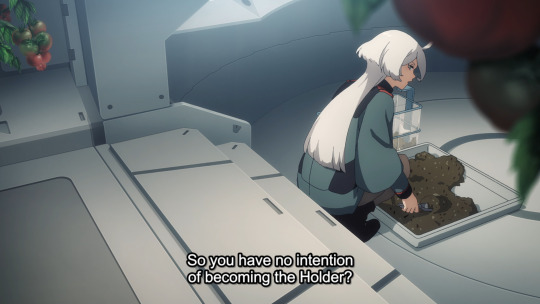



Even here, she correctly realizes that Shaddiq is manipulating the system in a way that he thinks will benefit them both, but in a way that still undermines her autonomy and decisions. And in sheer defiance of his actions that continue to show is complete lack of trust in her, she challenges him to a duel even with the deck stacked against her.
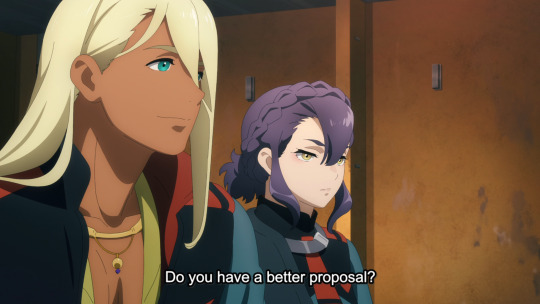
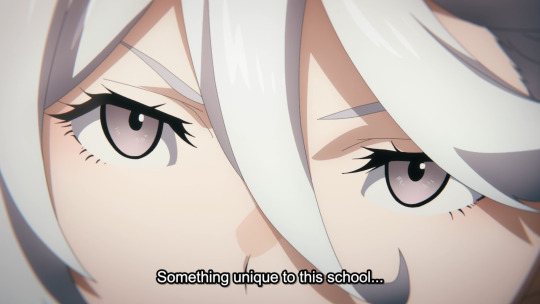


In this scene where we see Miorine planning for the duel using tomatoes, she even calls out Shaddiq's behavior to his face, and it's telling that Shaddiq doesn't think he's treating her like an object, just because he's not like the other men in the group.
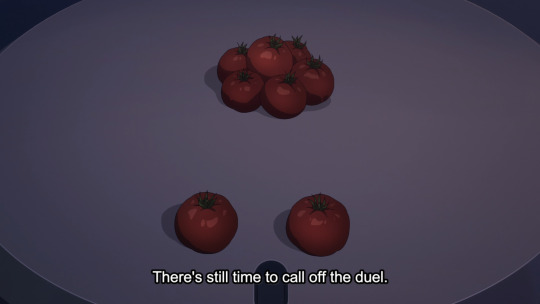


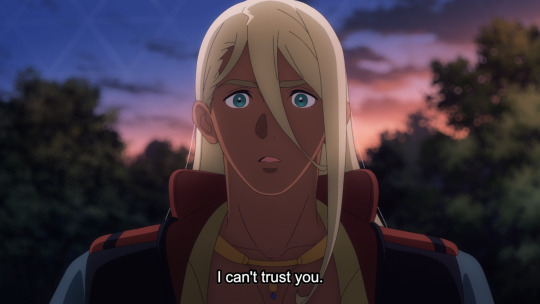
Suletta's unwavering trust in Miorine vs. Shaddiq's lack of trust in anyone but himself. Again, even with Suletta, Shaddiq thinks he knows what's best for Miorine and can convince her to side with him.
And Suletta completely rejects him with full belief in Miorine, something Shaddiq lacks.

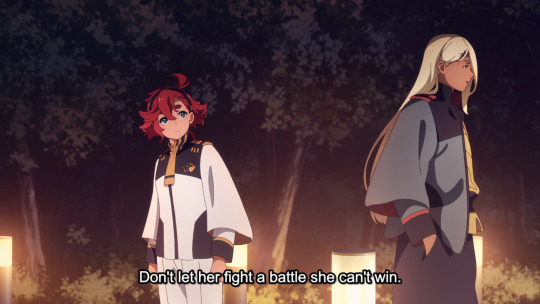

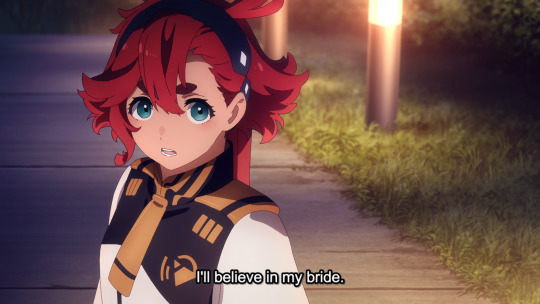
The duel against Grassley House might be my favorite battle in the whole series. It's incredibly exciting, wonderfully choreographed and has one of the most dramatic moments in the show with Aerial reaching Permet Score 6. Suletta finally gets to show off her stuff, this time fully on her own, and perfectly manages a 6v1 situation long enough to draw Shaddiq into Miorine's trap. We even get to see the rarely used beam blade function of the Aerial's rifle used with clinical proficiency.




I love the way they showed Prospera staring at the Beguir-Pentes of Grassley. There's no way she doesn't remember the Beguir-Beu from Folkvangr. And while the tear here is probably for Eri growing one step closer to freedom, I also think there's a bit of catharsis in seeing her daughters overcome the Antidote system and the successor of the suit that killed her husband.




I know a lot of people read romantic intent in these lines, and certainly from Shaddiq, there is. But I don't take Miorine's "Too little, too late" to mean it's too late to be with her romantically (because she was never interested in him that way), but it was too late to try and help her through the Holder system and be the friend she desperately needed. She now has Suletta, someone who she loves and trusts, who came to aid without any ulterior motives or expectations, and who explicitly trusts her. Two things Shaddiq wasn't willing to do when she needed it the most from him.
And as we see later in the series, he still doesn't fully respect her even after this.

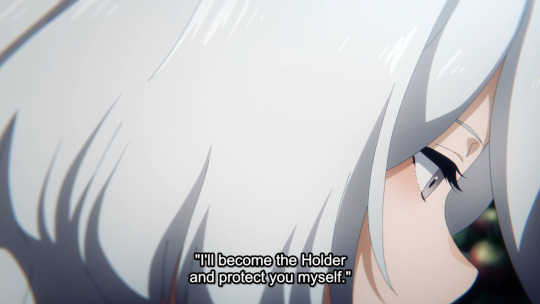


BONUS: Suletta doing the equivalent of emote dancing on Shaddiq's body will never not be hilarious to me. ALSO, she remembered that Miorine had this broadcast everywhere and is trying her best to advertise for the company, she's such a good girl.

30 notes
·
View notes
Text

LETTERS FROM AN AMERICAN
March 29, 2024
HEATHER COX RICHARDSON
MAR 30, 2024
On Wednesday the nonprofit, nonpartisan Institute for the Study of War published a long essay explaining that Russia’s only strategy for success in Ukraine is to win the disinformation war in which it is engaged. While the piece by Nataliya Bugayova and Frederick W. Kagan, with Katryna Stepanenko, focused on Russia’s war against Ukraine, the point it makes about Russia’s information operation against Western countries applies more widely.
The authors note that the countries allied behind Ukraine dwarf Russia, with relative gross domestic products of $63 trillion and $1.9 trillion, respectively, while those countries allied with Russia are not mobilizing to help Russian president Vladimir Putin. Russia cannot defeat Ukraine or the West, they write, if the West mobilizes its resources.
This means that the strategy that matters most for the Kremlin is not the military strategy, but rather the spread of disinformation that causes the West to back away and allow Russia to win. That disinformation operation echoes the Russian practice of getting a population to believe in a false reality so that voters will cast their ballots for the party of oligarchs. In this case, in addition to seeding the idea that Ukraine cannot win and that the Russian invasion was justified, the Kremlin is exploiting divisions already roiling U.S. politics.
It is, for example, playing on the American opposition to sending our troops to fight “forever” wars, a dislike ingrained in the population since the Vietnam War. But the U.S. is not fighting in Ukraine. Ukrainians are asking only for money and matériel, and their war is not a proxy war—they are fighting for their own reasons—although their victory could well prevent U.S. engagement elsewhere in the future. The Kremlin is also playing on the idea that aid to Ukraine is too expensive as the U.S. faces large budget deficits, but the U.S. contribution to Ukraine’s war effort in 2023 was less than 0.5% of the defense budget.
Russian propaganda is also changing key Western concepts of war, suggesting, for example, that Ukrainian surrender will bring peace when, in fact, the end of fighting will simply take away Ukrainians’ ability to protect themselves against Russian violence. The authors note that Russia is using Americans’ regard for peace, life, American interests, freedom of debate, and responsible foreign relations against the U.S.
The authors’ argument parallels that of political observers in the U.S. and elsewhere: Russian actors have amplified the power of a relatively small, aggressive country by leveraging disinformation.
The European Union will hold parliamentary elections in June, and on Wednesday the Czech government sanctioned a news site called Voice of Europe, saying it was part of a pro-Russian propaganda operation. It also sanctioned the man running the site, Artyom Marchevsky, as well as Putin ally Viktor Medvedchuk, a Ukrainian oligarch, saying Medvedchuk was running a “Russian influence operation” through Voice of Europe.
The far right has been rising in Europe, and Nicholas Vinocur, Pieter Haeck, and Eddy Wax of Politico noted that “Voice of Europe’s YouTube page throws up a parade of EU lawmakers, many of them belonging to far-right, Euroskeptic parties, who line up to bash the Green Deal, predict the Union’s imminent collapse, or attack Ukraine.”
Belgian security services were in on the investigation, and on Thursday, Belgian prime minister Alexander De Croo added that Russian operatives had paid European Union lawmakers to parrot Russian propaganda. Intelligence sources told Czech media that Voice of Europe paid politicians from Belgium, France, Germany, Hungary, the Netherlands, and Poland to influence the upcoming E.U. elections. Germany’s Der Spiegel newspaper said the money was paid in cash or cryptocurrency.
Czech prime minister Petr Fiala wrote on social media: “We have uncovered a pro-Russian network that was developing an operation to spread Russian influence and undermine security across Europe.” "This shows how great the risk of foreign influence is," Dutch prime minister Mark Rutte told journalists. "It's a threat to our democracy, to our free elections, to our freedom of speech, to everything."
There are reasons to think the same disinformation process is underway in the United States. Not only do MAGA Republicans, including House speaker Mike Johnson (R-LA), parrot Russian talking points about Ukraine, but Russian disinformation has also been a key part of the House Republicans’ attempt to impeach President Joe Biden.
Republicans spent months touting Alexander Smirnov’s allegation that Biden had accepted foreign bribes, with Representative James Comer (R-KY) and Senator Chuck Grassley (R-IA) calling his evidence “verifiable” and “valuable.” In February the Department of Justice indicted Smirnov for creating a false record, days before revealing that he was in close contact with “Russian intelligence agencies” and was “actively peddling new lies that could impact U.S. elections.”
On March 19, former Rudy Giuliani associate Lev Parnas testified about the investigation into Biden’s alleged corruption before the House Oversight Committee at the request of the Democrats. Parnas was part of the attempt to create dirt on Biden before the 2020 election, and he explained how the process worked.
“The only information ever pushed about the Bidens and Ukraine has come from Russia and Russian agents,” Parnas said, and was part of “a much larger plan for Russia to crush Ukraine by infiltrating the United States.” Politicians and right-wing media figures, including then-representative Devin Nunes (R-CA), Senator Ron Johnson (R-WI), The Hill reporter John Solomon, Fox News Channel personality Sean Hannity, and other FNC hosts, knew the narrative was false, Parnas said, even as they echoed it. He suggested that they were permitting “Russia to use our government for malicious purposes, and to reward selfish people with ill-gotten gains.”
The attempt to create a false reality—whether by foreign operatives or homegrown ones—seems increasingly obvious in perceptions of the 2024 election. There has been much chatter, for example, about polls showing Trump ahead of Biden. But the 2022 polls were badly skewed rightward by partisan actors, and Democrat Marilyn Lands’s overwhelming victory over her Republican opponent in an Alabama House election this week suggests those errors have not yet been fully addressed.
Real measures of political enthusiasm appear to favor Biden and the Democrats. On Wednesday, Molly Cook Escobar, Albert Sun, and Shane Goldmacher of the New York Times reported that since leaving office, Trump has spent more than $100 million on legal fees alone. He is badly in need of money, and his reordering of the funding priorities of the Republican National Committee to put himself first means that the party is badly in need of money, too.
Donors’ awareness that their cash will go to Trump before funding other Republican candidates might well slow fundraising. Certainly, small-donor contributions to Trump have dropped off significantly: Brian Schwartz of CNBC reported last week that “[i]n 2023, Trump’s reelection campaign raised 62.5% less money from small-dollar donors than it did in 2019, the year before the last presidential election.”
Billionaires Liz and Dick Uihlein have recently said they will back Trump, and Alexandra Ulmer of Reuters reported on Tuesday that other billionaires had pooled the money to back Trump’s then–$454 million appeal bond before an appeals court reduced it. But Ulmer also noted that there might be a limit to such gifts, as they “could draw scrutiny from election regulators or federal prosecutors if the benefactors were to give Trump amounts exceeding campaign contribution limits. While the payment would not be a direct donation to Trump's campaign, federal laws broadly define political contributions as ‘anything of value’ provided to a campaign.”
Meanwhile, the fundraising of Biden and the Democrats is breaking records. Last night, in New York City, former presidents Bill Clinton and Barack Obama joined Biden onstage with television personality Stephen Colbert, along with event host Mindy Kaling and musical guests Queen Latifah, Lizzo, and Ben Platt. The 5,000-person event raised an eye-popping amount—more than $25 million—and the campaign noted that, unlike donations to Trump, every dollar raised would go to the campaign.
In his remarks, Biden said that the grassroots nature of the Democrats’ support showed in the number of people who have contributed so far to his campaign: 1.5 million in all, including 550,000 “brand-new contributors in the last couple of weeks.” Ninety-seven percent of the donations have been less than $200.
Tonight, Adrienne Watson, the spokesperson for the National Security Council, the president’s primary forum for national security and foreign policy, pointed to Russia’s devastating recent attacks on Ukraine’s energy grid and called again for Speaker Johnson to bring up the bipartisan national security supplemental bill providing aid to Ukraine that the Senate passed in February. She warned: “Ukraine’s need is urgent, and we cannot afford any further delays.”
LETTERS FROM AN AMERICAN
HEATHER COX RICHARDSON
#War in Ukraine#Russian disinformation#Heather Cox Richardson#Letters From An American#Russia#Putin#Mike Luckovich#National Security#propaganda wars#Right Wing propaganda
13 notes
·
View notes
Text
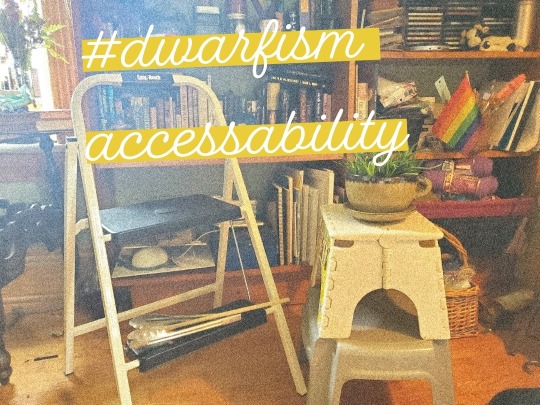
Photo ID: a photo of some accessibility tools including a foldable two step stool, a grey step stool with a white foldable one stacked on top and a houseplant on top of that. On the two step stool there is a pair of metal tongs and a wooden spoon. All are in front of the book shelf in my room containing queer and disabled authors, fandom figures, art supplies, and a small rainbow flag.
Let's talk dwarfism access tools!
Living with Achondroplasia dwarfism, my days are rife with access issues as a result of my short stature and chronic pain. Like all disabled folk and spoonies, I access my world through problem solving and innovation - or in short, step stools and spatulas :) But I want to go a little deeper into the day to day tools I use for accessibility, to better share my experiences as a little person!
☆ Stools and Step Stools ☆
One major access issue for me is simply the use of standard furniture - which exists to meet the needs of abled bodied, average height people. In order to utilize furniture - whether that be counters, sinks, stoves, high tables, chairs, or cupboards - I require the addition of stools. That means that prior to any household or workplace task, I must first stand on a platform of sorts, and move said platform as the location of my tasks change (say, going from the dish washing sink to the kitchen counter and back again). Something that ableds often forget, is that existing as a disabled person means things take twice the time with twice the effort. I additionally use step stools as foot rests when sitting in chairs - as my leg joints are prone to subluxation (partial dislocation) when they dangle.
Step stools aren't a perfect solution, as I often only have access to them in my own home. (Common to popular belief, my house has never been structurally adjusted to my needs, for financial and communal reasons. Instead, I use tools that are cheap, movable and removable.) Once I'm in town or at another person's house, a lot of furniture becomes inaccessible - particularly public washrooms, hospital furniture, and bar style seating areas (existing on top of access issues surrounding the use of my rollator). At times I can bring my own fold up stool, but it's largely impractical in a lot of social settings.
☆ Tongs, Spoons, and Spatulas ☆
When stools aren't enough - such as with storage cabinets, top loading washers, or wide table tops - I then turn to kitchen tongs, wooden spoons or spatulas to grab and reach. I've personally had no luck with advertised grabbing tools, as my grip is weak and I find them too long to have good balance. In a pinch you'll often hear me whisper "I just need a really long stick..." and search around for the nearest item of resemblance. It's really all about problem solving and the occasional smashed jar of pasta sauce.
☆ Rollator/Mobility Aid ☆
Due to my medical history and the possession of the more hindering characteristics of my disability (arthritis, partial dislocations, chronic pain) I require the use of a rollator, which is an access tool that not all little people use. This limits me on rough terrain and inaccessible public spaces, but provides me with some pain relief and the freedom to better enjoy the activities in my life.
☆ Hearing Aids ☆
A lesser known fact about many types of dwarfism is that they can result in hearing loss! This is due to the bone formation in the inner ear, and the resulting proneness to ear infections. Throughout my childhood I had countless tube replacements to help prevent infections (to which I was still VERY prone), and the resulting scar tissues from those procedures has caused my hearing to steadily decline over the last 8 or so years - so I wear hearing aids :) They're an imperfect science, but allow me (along with slowly leaning ASL) to communicate with the world around me :)
•
I hope this post has provided some insight on dwarfism accessibility from my perspective, and has encouraged you to think about the smaller disabled community I'm a part of :)
- Elliot (they/them)
#dwarfism#dwarfism awareness#little people#disability#accesibility#disability awareness#little person#spoonie#chronic pain#access#surgery mention
469 notes
·
View notes
Text
For fellow disabled, mobility aid users and non-disabled.
Keep using those aids if it helps you. It isn't away from others or you, they're meant to assist and bring back freedom.
Don't listen albeist comments, those doesn't mean you aren't valid to use one. USE THEM.
Had a diagnosis or not, you are still valid and deserve respect!!
57 notes
·
View notes